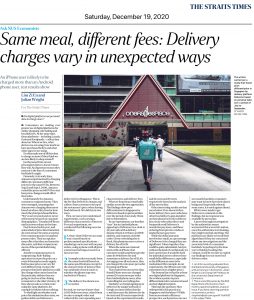Discrepancies in Meal Delivery Charges?
December 24, 2020
The thought-provoking opinion piece in The Straits Times “Ask: NUS Economists” monthly series, “Same meal, different fees: Delivery charges vary in unexpected ways” raises questions on the possible methods used by delivery applications to exploit user information. Published on 19 December 2020, this article by Dr Julian Wright (NUS Department of Economics) and Lim Zi En (NUS Department of Economics, Graduate) discusses a case study on Deliveroo to investigate such accusations.
The authors write that digital platforms are known for gathering data such as the location, address, device information, and purchase history of their users. It is rumoured that they may charge users personalised prices based on the information gathered about them. Amazon charging different prices for the same DVDs in 2000 is one such instance that led to immense consumer outrage. Interestingly, promotion codes and surge pricing, which are common features of many online services, are forms of price discrimination.
The authors’ case study on Deliveroo’s delivery fee-charging structure was conducted through randomised experiments and over 1,000 customer surveys. It revealed that, on average, iPhone users are “charged 29 cents more per order than Android phone users”. Furthermore, creating a Deliveroo account via Google or Facebook also leads to paying up to 54 cents and 39 cents more, respectively, as compared to users who sign up by email. Age becomes a discriminating factor as well since those under 20 and over 60 incur lower delivery charges. Although the difference in charges is merely in cents, when taken as a percentage of the total fee, there is a marked difference in price for users of varied demographics.
Overall, this case study proves that at least one of the most popular food delivery services in Singapore engages in price differentiation for its customers, as per the information collected via their accounts and devices. It is uncertain how common this practice is in Singapore, and if investigations by the authorities would lead to any changes, as services can very easily alter their algorithms to protect themselves.

